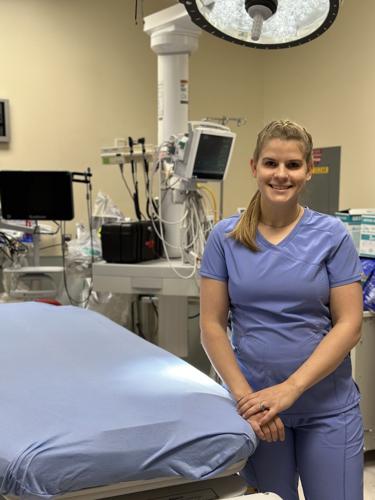Every day, trauma teams in hospital emergency rooms nationwide work to save lives. One such hero that can be found diligently performing these lifesaving duties is Holly Loh, a registered nurse and Dorchester County resident who specializes in trauma.
Loh works in the Trident Medical Center emergency room, a level II trauma center that sees more trauma patients than any other hospital in the Lowcountry. Since the trauma program began in 2016, Trident Medical has treated more than 14,000 trauma patients, including 2,127 last year alone.
Loh has been a nurse for nearly 11 years and was exposed to trauma as she began working at Trident in 2015.
“Initially, I was jumping in to help as needed,” Loh said. “We now have trauma teams, small groups of around five people, full time for day shift and night shift that work closely with our nurse practitioners, physician assistants and trauma surgeons.”
Trident Medical Center categorizes traumas into one of two levels, either a level I trauma or a level II trauma.
“A level II trauma is something that is determined as high risk like a fall over 10 feet, a car accident with injuries or where the car has rolled or experienced intrusion as well as any kind of penetrating wound such as a gunshot or knife wound,” said Loh.
Since working in trauma, Loh has seen many preventable traumas including falls and motor vehicle accidents, many of which caused have been caused by alcohol consumption.
May is National Trauma Awareness Month.
“National Trauma Awareness Month is important to bring awareness to the community,” said Loh. “We see a large percentage of the trauma patients in this community. A lot of times, people are not aware of common things that may result in trauma which are highly preventable.”
“Throughout Trauma Awareness Month, we do a lot of community outreach,” added Loh. “One thing we do, with it being prom season, is that our outreach coordinator will go to the high schools to bring awareness to the dangers of drunk driving.”
Working in trauma obviously brings with it certain challenges and rewards.
“The most beautiful thing about working in trauma is that you are seeing people on their worst day, and you can really see a difference and turn a patient’s entire life around,” said Loh. “We have this thing called the Trauma Golden Hour, where treatment within the first hour really determines how well the patient’s prognosis will be.”
“Being a part of that initial trauma team is a great experience,” added Loh. “You then get to see them later, up on the floors and then again when they are discharged. We have even had patients come back to see us.”
On days when her job is more challenging, Loh finds solace in her toolkit of hobbies. Loh is a blackbelt in Judo. She also enjoys playing with her dogs and cats and likes to read.
Closing out her remarks, Loh states that some of the easiest things to do to avoid trauma are wearing your seatbelt and refraining from drinking and driving.








